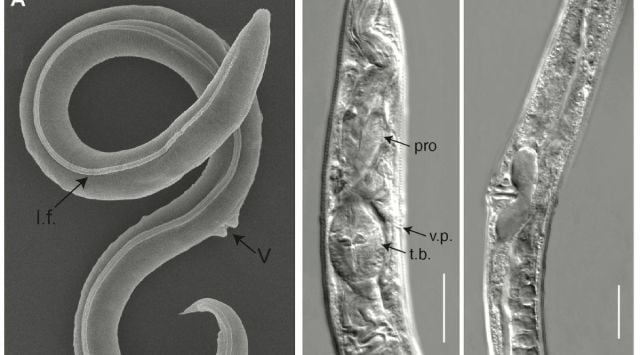46,000-year-old worms brought back to life from Siberian permafrost
Scientists brought microscopic worms back to life after they were frozen in the Siberian permafrost for 46,000 years.
 The nematodes can survive for tens of thousands of years in harsh climates by going into a dormant state. (PLOS Genetics)
The nematodes can survive for tens of thousands of years in harsh climates by going into a dormant state. (PLOS Genetics) Scientists discovered and reanimated two kinds of frozen microscopic nematodes or roundworms in Siberia five years ago. A new study on them published Thursday reveals their secrets, including the fact that they are 46,000 years old and one of them is an entirely new species that has never before been discovered.
Many animals like nematodes, and more famously, tardigrades, can survive extreme conditions by entering a dormant state called “cryptobiosis.” The worms found by the scientist were taken from a fossilised burrow in silt deposits in the northeastern Arctic. Based on analysis of the plant material from this burrow, the study published in the journal PLOS Genetics says that these worms were frozen since the late Pleistocene era between 45,839 and 47,769 years ago.
 “The radiocarbon dating is absolutely precise, and we now know that they really survived 46,000 years,” study co-author Teymuras Kurzchalia told Scientific American. Kurzchalia is a cell biologist emeritus at the Max Planck Institute of Molecular Cell Biology and Genetics in Dresden.
“The radiocarbon dating is absolutely precise, and we now know that they really survived 46,000 years,” study co-author Teymuras Kurzchalia told Scientific American. Kurzchalia is a cell biologist emeritus at the Max Planck Institute of Molecular Cell Biology and Genetics in Dresden.
The researchers used genome sequencing, assembling and phylogenetic analysis of the worms’ relationship to modern species and discovered that it belongs to a previously unknown species—-Panagrolaimus kolymaensis.
These 46,000-year-old worms came to life after scientists defrosted them from the Siberian permafrost pic.twitter.com/oF2T5LdbwQ
— Reuters (@Reuters) July 28, 2023
Kurzchalia explained to CNN that organisms in a cryptobiotic state can survive the complete absence of water and oxygen and withstand other extreme conditions including heat and cold in a “state between life and death.” According to him, “one can halt life and then start it from the beginning.”
They also tested the hardiness of the ancient worms by mildly drying them in the laboratory. When they did that, the worms produced a sugar called trehalose, which might help them survive harsh desiccation (drying) and freezing. Of course, the original worms, which have a lifespan of a few weeks, are long dead. Continuing experiments are performed on their descendants that came about through asexual reproduction.
The study increases the longest documented cryptobiosis period in nematodes by tens of thousands of years. With this ability to stay alive in extreme conditions in a dormant state, the worms can continue to survive for tens of thousands of years, and maybe more.
There is also a practical reason to study the impressive capabilities of the diminutive worms. “We need to know how species adapted to the extreme through evolution to maybe help species alive today and humans as well,” said study co-author Philipp Schiffer to the Washington Post. Schiffer is group leader at the Institute for Zoology at the University of Cologne.
Research like this can show how animals can adapt to habitat change caused by climate change at a molecular level and survive despite changing weather patterns. The researchers are now working to understand how long an organism can survive and be resurrected. It also raises the question of what it means for evolution and even the notion of extinction if animals that typically live for a few weeks can stretch out their lifespan by thousands of years, according to the Post.







